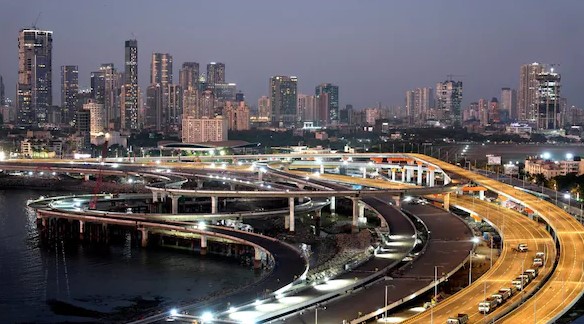Mumbai’s Coastal Road- Revolutionizing City Travel
Mumbai’s Coastal Road- Revolutionizing City Travel
Mumbai’s new north-bound bridge, connecting the Mumbai Coastal Road to the Bandra-Worli Sea Link, was recently opened, offering significant relief to commuters and reducing the city’s notorious traffic congestion. This addition, which went live on Monday, introduces three important interchanges that provide seamless connectivity to key areas like Worli, Prabhadevi, Lower Parel, and Lotus Junction. The bridge is operational from 7 a.m. to midnight and is expected to shorten travel time between Bandra and Marine Drive to just 10-15 minutes, a stark contrast to the previous travel durations.
The Coastal Road Project: A Vision Realized
The Coastal Road is part of Mumbai’s long-term urban development plan dating back to 1967. Work on this ambitious project commenced in 2018, with an initial target completion date of 2022. However, delays caused by the COVID-19 pandemic and other factors extended its timeline. With an estimated cost of Rs 14,000 crore, the first phase of the coastal road project spans 10.58 kilometers, linking Marine Drive’s Princess Street Flyover to the Worli end of the Bandra-Worli Sea Link.
This stretch includes a modern 4+4 lane setup and introduces cutting-edge infrastructure features like a bridge supported by stilts, elevated roadways, and twin tunnels. Strategically placed interchanges at key locations such as Amarsons Garden, Haji Ali, and Worli Seaface ensure smoother traffic flow and more efficient commuting.
One of the most notable components of this project is India’s first undersea tunnel, part of which has been operational since March 2024. This tunnel, with a diameter of 12.19 meters, runs 17 to 20 meters below sea level for a stretch of 2.07 kilometers, starting near Girgaon (ahead of Marine Drive). It passes under the Arabian Sea, Girgaon Chowpatty, and Malabar Hill, reaching its endpoint at Breach Candy’s Priyadarshini Park.
The south-bound arm of the coastal road was opened to the public in March 2024, connecting Worli to Marine Drive. The north-bound arm, stretching from Marine Drive to Haji Ali, opened in June, with the stretch between Haji Ali and Worli becoming fully operational by July 2024. The latest development, the north-bound bridge, measures 827 meters in length—699 meters of which stretch over the sea, with the remaining 128 meters forming the access road. The bridge features a 143-meter long, 27-meter wide, and 31-meter high ‘Bow Arch String Girder,’ weighing around 2,400 metric tons.
Green Spaces and Environmental Impact
As part of its commitment to sustainability, the Coastal Road project plans to create approximately 70 hectares of green space. This area will host cycle tracks, public parks, jogging paths, and even open-air auditoriums. These spaces will serve as new recreational hubs for Mumbaikars, blending urban development with green initiatives. Furthermore, a sea protection wall is under construction to shield the project from erosion and safeguard it against high sea waves, ensuring long-term durability.
Ongoing Expansion and Future Developments
The second phase of the Coastal Road project, which spans 20 kilometers between Versova and Dahisar, is currently under construction. Once fully completed, this phase will further improve travel time across the city. Already, the first phase has drastically reduced the commute between Girgaon and Worli, slashing the travel time from 45 minutes to just 10 minutes. Additionally, the project has improved travel routes from South Mumbai to the airport, making it more convenient for both residents and visitors.
From March 12 to December 31, 2024, more than 50 lakh vehicles have used the Coastal Road, with daily traffic averaging 18,000 to 20,000 vehicles. The project’s efficiency in managing traffic is already evident, and the ongoing developments are expected to enhance the experience even further.
A Game-Changer for Mumbai
According to Maharashtra’s Chief Minister, Devendra Fadnavis, the Coastal Road will not only save time and fuel for commuters but also play a vital role in reducing pollution levels in the city. As the project nears completion—94 percent of the work has been finished—the remaining work on the Prabhadevi connector is expected to wrap up in February 2025. Upon full completion, the Coastal Road will be a game-changer for Mumbai’s transportation landscape, offering faster, more efficient travel and transforming how Mumbaikars navigate the city.
Also Read – 25 Future Technology Megatrends and Predictions- Tech That Shapes Our World
